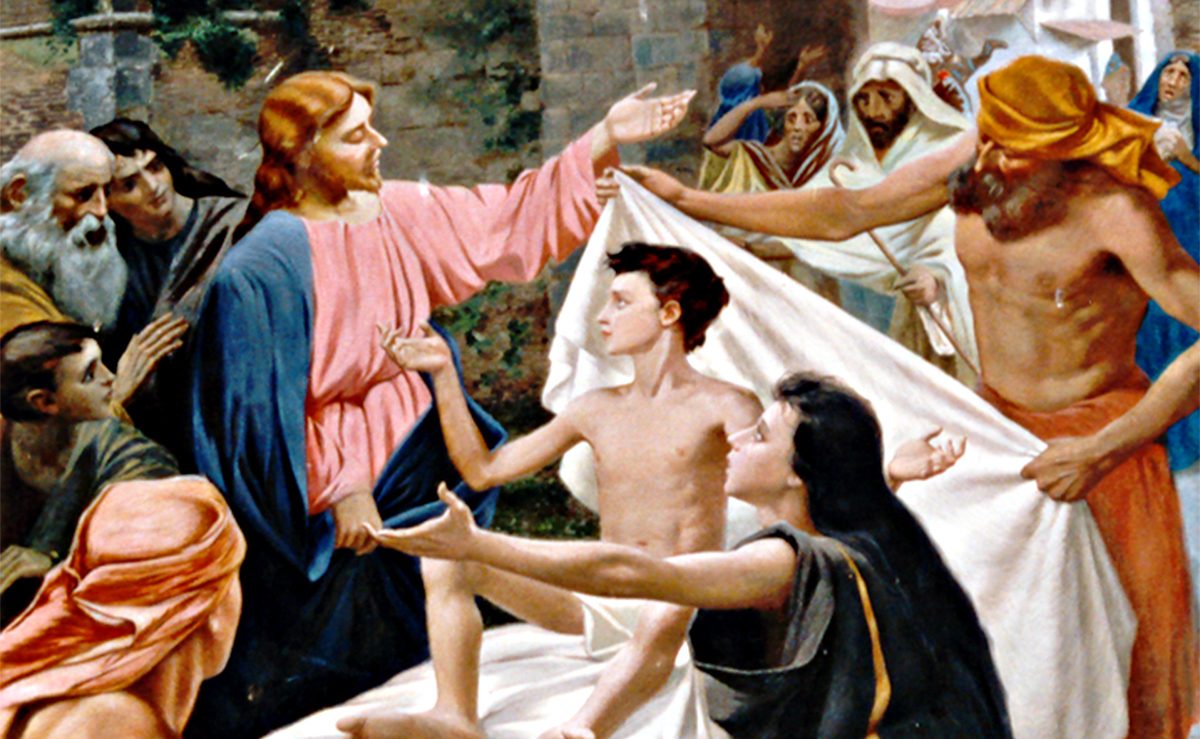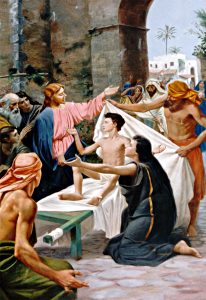
A reflection by Fr. Dave Warren, S.F.M., for the Tenth Sunday in Ordinary Time. First Reading: I Kings 17.17-21a, 22-24; Second Reading: Galatians 1.11-19; Gospel: Luke 7.11-17
Mohini was born in India on October 30, 1958. In 1960, at the age of two, she moved to the United States. She took up residence in the National Zoo in Washington, D.C. Mohini was a white Bengal tiger.
For some years, Mohini spent her days pacing back and forth in a 12-by-12-foot cage. The staff of the zoo felt sorry for her. They created a natural habitat for Mohini. It extended over several acres and contained hills, a pond, trees, and a variety of vegetation. And what did Mohini do? Mohini retreated to the corner of the enclosure. There she continued to pace back and forth hundreds of times every day, in a section which measured 12 feet by 12 feet. And so Mohini lived until she died in 1979.
We are Mohini. Life is much bigger than we think it is. We are half-alive.
We see clearly enough when other people are half-alive. When other people are hung-up on work or on trivialities, we say, “Get a life!” We see clearly when other people are half-alive. We see less clearly when we are the ones who are half-alive. Nevertheless, there are moments when we say to ourselves, “There has to be more to life than this!” There are moments when we know that something is missing in our lives. Sometimes we know what’s missing. More often we know that something’s missing, but we’re not quite sure what it is. We want to feel fully alive, but we don’t.
We are in bondage. We are in bondage to our limited idea of what life is all about. Like Mohini, we settle for less than what life can be. We need someone to come along and dispel the illusion. We need someone to come along and tell us, “Get a life!”
Jesus calls us to life beyond our limited expectations and beyond our limited imagination.
In today’s Gospel, Jesus raises the widow’s son from death to life. When I heard this story as a kid, I used to think that the story was incomplete. I wanted to hear what the young man experienced on the other side. Didn’t anybody ask him? Wasn’t anybody curious? I would have been!
We’ve all heard about “near-death experiences.” But these experiences are just that: near-death experiences. What’s it like to go beyond the point of no return? It’s too late now to ask the young man in today’s gospel. He’s dead— for the second time. At least, I haven’t heard that he is still alive. If he were still alive, I’m sure that the tourist brochures for the Holy Land would mention him. As it is, he goes down in history along with Lazarus and the daughter of Jairus as people who died twice.
If Jesus could raise the widow’s son from the dead, then why didn’t He keep him alive? The answer is that Jesus hasn’t come to add years to our life; he has come to add life to our years. He is more concerned about the living dead than He is about the dead dead.
We are the living dead—half-alive but also half-dead. We are unconscious. And North American culture keeps us unconscious.
Some years ago I was in Cuba and I happened to watch the local news one evening. There was a story about a new hydro-electric dam and the economic progress that Cuba was making. “That’s propaganda,” I said to myself and I switched to a Canadian channel. When I did so, I happened upon a commercial for La-Z-Boy chairs. Suddenly I realized that Canadian television was propaganda, too. The only difference between Cuban television and our own television is the kind of propaganda they serve: the message of Cuban television is that life is about effort; the message of North American television is that life is about comfort.
Advertising is propaganda—not just propaganda for a particular product but propaganda for a whole way of living. Advertising is propaganda for “the good life.” And what is the good life? Comfort. Ease. Style. Wealth. Creating the right impression.
We are in bondage. We are in bondage to life as advertising defines it. We are in bondage and we don’t even know it. We are in bondage to public opinion. We are in bondage to values we absorb without thinking. We are unconscious. And our culture keeps us unconscious. The entertainment industry keeps us from thinking. We are in bondage to weapons of mass distraction.
We are like Mohini, the white Bengal tiger. We have settled for less than life can be. There’s more to life than we think there is. There’s more to life than we feel comfortable with. Our desires are too small.
Jesus has come to set our desires free. We are half-alive and Jesus has come to raise us from the dead. If Jesus can raise the dead to life, what can He not do for the half-dead? We’re not dead yet; we’re just having a near-death experience.
When I first heard today’s gospel as a kid, I used to wonder what the young man experienced on the other side. Whether or not he talked about it, the gospel is silent. Jesus is more concerned about life before death than He is about life after death. If we have life before death, then life after death will take care of itself.

